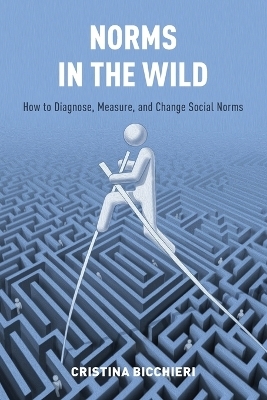
Norms in the Wild
How to Diagnose, Measure, and Change Social Norms
Seiten
2017
Oxford University Press Inc (Verlag)
978-0-19-062205-3 (ISBN)
Oxford University Press Inc (Verlag)
978-0-19-062205-3 (ISBN)
In Norms in the Wild, distinguished philosopher Cristina Bicchieri argues that when it comes to human behavior, social scientists place too much stress on rational deliberation. In fact, she says, many choices occur without much deliberation at all. Two people passing in a corridor automatically negotiate their shared space; cars at an intersection obey traffic signals; we choose clothing based on our instincts for what is considered appropriate. Bicchieri's theory of social norms accounts for these automatic components of coordination, where individuals react automatically to cues that focus their attention on what the norm is in that situation. Social norms thus act as rules for making choices in a social world where people expect others -- often unconsciously -- to follow the same rule. Some norms enable seamless social co-operation, while others are less beneficial to human flourishing.
Bicchieri is famous for her interdisciplinary work on game theory and most recently her work on social norms, and Norms in the Wild represents her latest challenge to many of the fundamental assumptions of the social sciences. Bicchieri's work has broad implications not only for understanding human behavior, but for changing it for better outcomes. People have a strongly conditioned preference for following social norms, but that also means that manipulating their expectations can cause major behavioral changes. Bicchieri has been working recently with UNICEF and other NGO's to explore the applicability of her views to issues of human rights around the world. Is it possible to change social expectations around forced marriage, genital mutilations, and public health practices like vaccinations and sanitation? If so, how? What tools might we use? This short book explores how social norms work, and how changing them - changing preferences, beliefs, and especially social expectations - can potentially improve lives all around the world. It will appeal to an unusually broad range of readers including philosophers, psychologists and others in behavioral sciences, and anyone involved in public policy or at NGOs.
Bicchieri is famous for her interdisciplinary work on game theory and most recently her work on social norms, and Norms in the Wild represents her latest challenge to many of the fundamental assumptions of the social sciences. Bicchieri's work has broad implications not only for understanding human behavior, but for changing it for better outcomes. People have a strongly conditioned preference for following social norms, but that also means that manipulating their expectations can cause major behavioral changes. Bicchieri has been working recently with UNICEF and other NGO's to explore the applicability of her views to issues of human rights around the world. Is it possible to change social expectations around forced marriage, genital mutilations, and public health practices like vaccinations and sanitation? If so, how? What tools might we use? This short book explores how social norms work, and how changing them - changing preferences, beliefs, and especially social expectations - can potentially improve lives all around the world. It will appeal to an unusually broad range of readers including philosophers, psychologists and others in behavioral sciences, and anyone involved in public policy or at NGOs.
Cristina Bicchieri is S.J.P. Harvie Professor of Social Thought and Comparative Ethics in the Departments of Philosophy and Psychology Departments, and director of the Philosophy, Politics and Economics program, the University of Pennsylvania.
Acknowledgments
Preface
Chapter 1: Diagnosing norms
Chapter 2: Measuring norms: consensus and conformity
Chapter 3: Norm change
Chapter 4: Tools for change
Chapter 5: Trendsetters
Bibliography
| Erscheinungsdatum | 07.01.2017 |
|---|---|
| Verlagsort | New York |
| Sprache | englisch |
| Maße | 206 x 140 mm |
| Gewicht | 295 g |
| Themenwelt | Geisteswissenschaften ► Philosophie ► Ethik |
| Mathematik / Informatik ► Mathematik ► Finanz- / Wirtschaftsmathematik | |
| Wirtschaft | |
| ISBN-10 | 0-19-062205-9 / 0190622059 |
| ISBN-13 | 978-0-19-062205-3 / 9780190622053 |
| Zustand | Neuware |
| Haben Sie eine Frage zum Produkt? |
Mehr entdecken
aus dem Bereich
aus dem Bereich


